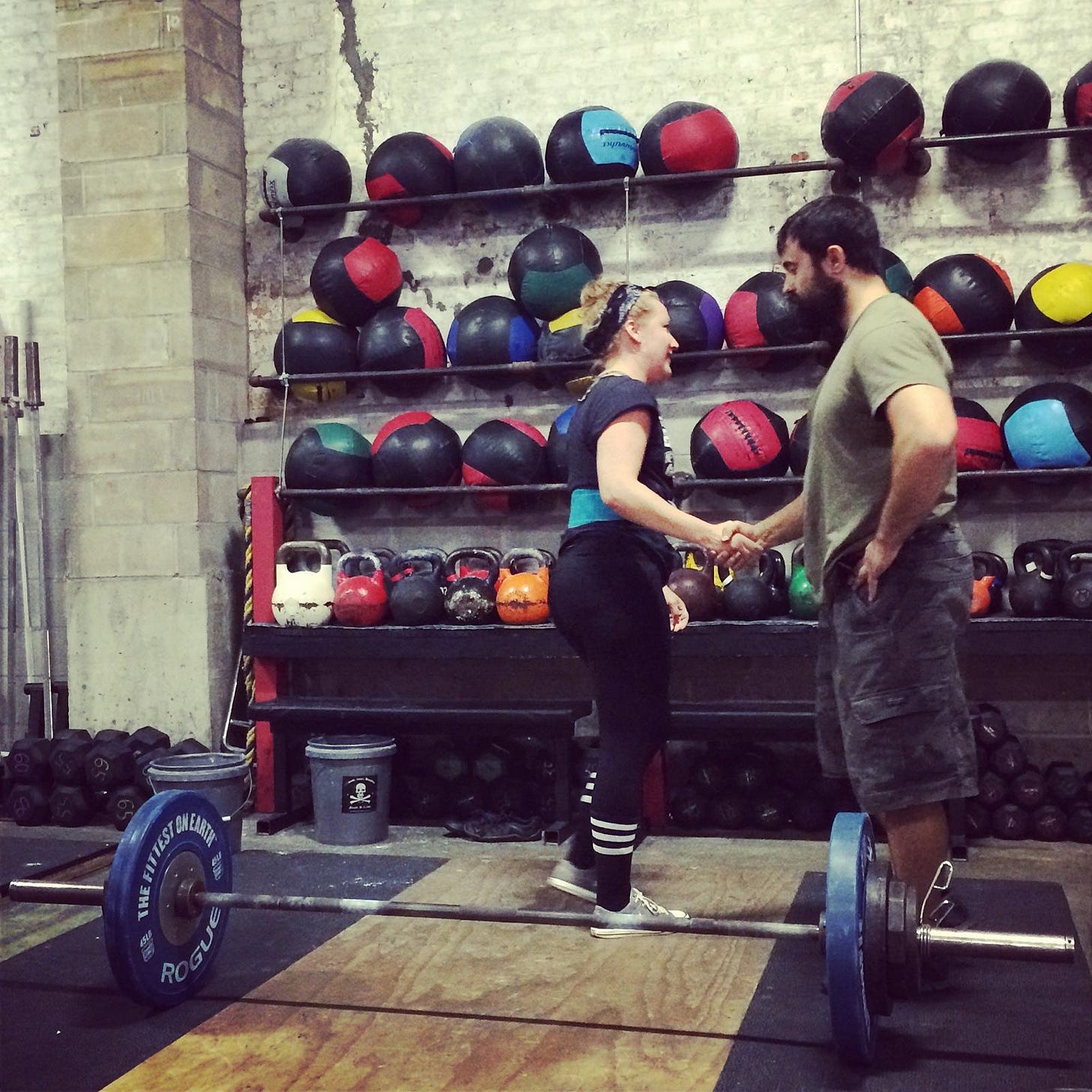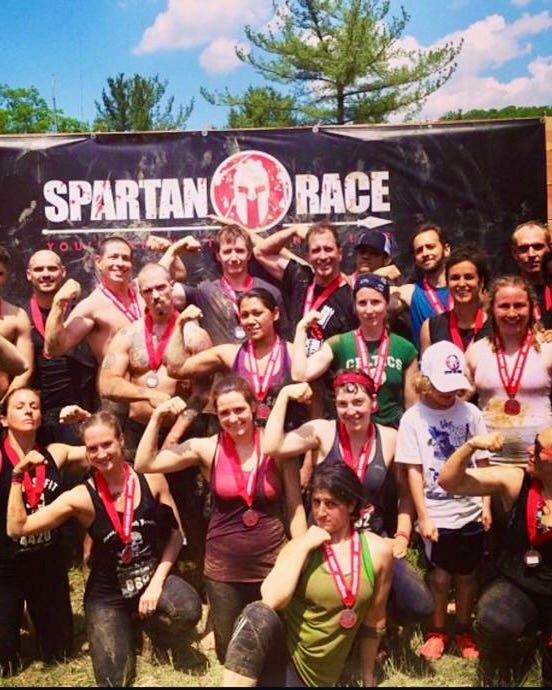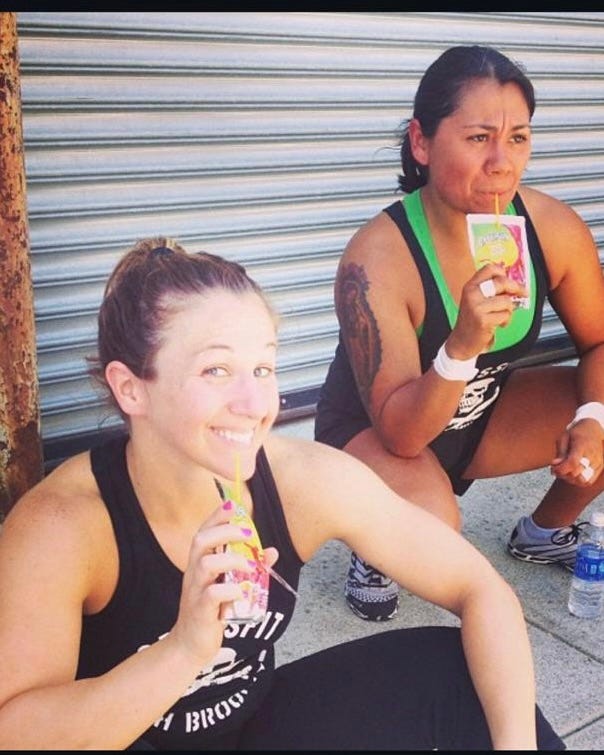What the Best Coaches Teach Us (That Has Nothing to Do With Fitness)
A tribute to the coaches to teach us how to human better.
Coaches aren’t just for athletes. From grief to grit, here’s what I learned from CrossFit, Muay Thai, and the mentors who saw me through life’s transitions—and taught me how to show up with presence, humility, and humor. A note of gratitude to those who made it feel safe enough to try to human better.
Jeremy making me believe the lift is possible.
For Jess Fox
Dedicated to one of the original TFBAs (Total Fucking Bad Asses), Jess Fox, who transitioned last week. Her loss inspired nostalgia towards how a few of my favorite coaches changed my process of trying to human better.
Top photo, Spartan Race with Fox’s in the middle showing the guns, me at the side, knowing I would never, ever do another Spartan race. Bottom photo, MeLo on the left and Lady Fox on the right, being epic with rehydration post-workout.
I used to think coaches were for athletes chasing medals. I just didn’t want a gut. But a college buddy bullied me into trying CrossFit South Brooklyn (CFSBK). The first time I trudged through a part of Gowanus that looked like a demilitarized zone after dark, I’d already decided not to come back after the trial class. Years after leaving the school yard, you still never want to let the cool kids get a shot at rejecting you.
David and Fox ran the intro class. Chris Fox had that city edge, and a way of raising one eyebrow that made posturing feel like a waste of time. David was too genuinely nice and curious about the world to dislike. By the end of the warm-up, quitting felt like a less interesting choice. So I stayed for the class. Then I signed up for a few more.
That class started a fitness path I've meandered for the past fifteen years. Over the years, a few coaches gifted me little mantras I use to feel a little less stuck in life. Most concepts aren't technically about fitness—though, thank God, my form and my body are far less of a train wreck than they were all those years ago. The real lessons are about how to deal with myself as I move through the world.
Above all else, it's about community.
We are all just silly, tender animals trying to survive. As pack animals, we need—and thrive in—community. David, the founder of CFSBK, saw that strong community is the foundation of what makes us safe enough to attempt better versions of ourselves. The price of entry to that community is being coachable. Walk through the door curious and willing to take on feedback. Being coachable is not just an individual trait. In the right community, it becomes a shared norm. Growth is far more attainable and enjoyable with the shared norm of being coachable.
Form over ego.
Many CrossFit gyms let you confuse going harder with doing better. With Chris as my foundations coach, that wasn’t an option. After my first few squats my shiny heavy metal bar got replaced by a plastic PVC pipe until I could fix my form. My face probably showed my bruised ego. Chris said I’d thank him later. I wasn’t sure. Of course, he was right. Small, humble steps in the right direction are everything.
Laugh at the suck.
McDowell used to cackle at just how miserable the workout was going to be, giggling as he read the workout of the day and noting where we would want to give up. Instead of tightening up in anticipation, you took comfort in some person five times fitter than you laughing at what we put ourselves through. Embrace the suck—not in the way people misread the Stoics, but in the way that with the right people the suck is fun or at least funny.
Love the beautiful basics.
Jeremy was an expert at keeping it simple. That’s how you build strength. I'd get all up in my head and introduce complexity to get in my own way.
Me: "What should I do? What about programming while I'm travelling?"
Jeremy: “Squat.”
Me: “Yeah, but what if I already squatted this week?”
Jeremy: “Squat again.”
His lifting cues were usually: “Knees. Back. Chest. Up.” No unnecessary information. When I had to come back from labrum surgery, he made it doable. Build back on the basics. All the woo-woo embodiment coaches in the world could never give me what the Strength Cycle did. Beautiful basics that helped me sit with and listen to my body. Man, I miss sitting those strength total numbers.
Use your words.
I came to the gym to shut my brain off. But when I started missing weights I knew I could hit, Margie didn’t let me sulk. She made me talk.
“Use your words. Don’t talk about the lift. What’s going on?”
The brain and body don’t care how badly you want to keep them in separate corners. You can’t outthink your body. You can’t outrun your mind.
Be bad at things.
It feels good to protect the veil of competence, but it's not useful. Noah always had some new, random mobility or strength move worked into the day.
I’d say, “I’m going to be terrible at that.”
He’d shrug. “Yeah, probably. It’s the first time.”
Then I’d be terrible, as expected. He’d watch and say, “Huh. You have an expressive pain face.” No judgment. No teasing. No ra-ra cheerleader energy. Just accepting the nature of being new at things. Now I seek out things I know I’ll be bad at. That acceptance keeps my A-type brain out of the way long enough to enjoy trying. I won’t be good. That’s fine.
Picture running in the rain.
MeLo once told me, “It’s like when you hate running, but finally make yourself go—and then it starts raining. At first you’re pissed and think, 'Damn it now I have to run in the rain!' Then you kinda start feeling like a bad ass for running despite the rain, you think, 'Hell yeah I'm running in the rain.'"
Things happen. You get to decide how you feel about them. You can run in the rain pissed off, or you can get a kick out of it.
Nick not letting me quit.
Motivation Begins with Being Seen
Nick watched everyone closely. He never commented, never judged. Just kept running internal files on how people operate. During a miserable 10,000K rowing test—the day after Halloween, still hungover, glitter skull paint in my ear—I was about to quit.
He saw the moment I wanted to give up. If he yelled a motivation slogan or tried to cheer me across the line, I would've rolled off the erg. Instead, he leaned in, dropped his voice an octave, and said, “You be stubborn, Lloyd.”
He tied me needing to dig inside for the last burst of effort to something in my self I couldn’t argue with. I am, in fact, stubborn. Coaching, at it's very best, in every arena of life, makes you feel seen.
Attempting to put me back together after breaking me.
Be playful. One Body.
Learning Muay Thai later in life requires a tolerance for bruised shins and egos. For me, it's also about figuring out how to cope with some body dissociation.
A core goal of Muay Thai translates as One Body. From reading your opponent, down through how you plant your feet, up through your hips, your spine, your chin, and into how you throw the kick—every piece connects. It’s one body moving as a whole. This concept in martial arts is so good for body dissociation, and also why it is so freaking hard to learn.
Thai instructors start training around seven, where play is inherently part of the teaching equation. Most instructors teach beginner forty-three-year-olds the same way they teach beginner seven-year-olds. If they see you get frustrated, they get a little silly. Let you land a clean front kick (teep). Then throw themselves back, yelling, “Oweiee!”
Raging bad asses being playful leaves you little choice but to grin, drop the overthinking, and get back into your body. Then you can feel yourself start to move through space in one fluid movement, and as a side effect, throw better elbows.
Life is in the transitions.
Relax and find your rhythm between movements. Doug and Miguel taught me that striking isn't just about force, it's about rhythm. They didn’t just show combinations—they watched how I moved between. If I tensed, they shook their heads. Relax, follow the music, find your rhythm. How you handle the transitions makes you ready for what’s next.
Be intentional with your presence.
Jess (Lady Fox) always walked around with intentional presence as she coached at CFSBK. Years later, after I fell in love and wanted to lose my “fat and happy” weight, she became my nutrition coach. Her program focused on intentionality, teaching participants to listen to their bodies. Not exactly a comfortable process, but Jess's nature made it easier to attempt to settle inward.
In the middle of the training program with Jess, my husband, Tim, died suddenly. Several CFSBK people made the trip from New York to DC for the memorial. I remember seeing Jess’s face first. I was confused to see anyone who wasn't in Tim's world there. I asked, “Why are you here?” Jess was trademark steady replied, "This is your community. We are here to support you."
Back to that foundational lesson, it's all about community. For Tim's family, friends, and his Marines, I felt I had to be the new “good” widow, focused on honoring him. Jess and the crew let me be me for a few moments that day. They saw me for who I was in that exact moment and didn't bat an eye when I fell apart. They laughed along with even my darkest humor, giving me momentary reprieve within the absurdity of the situation. They showed me I had people who would stay with me through the fog of pain, logistics, and the performance expected of the one who survives.
After the memorial, I tried to stick with the nutrition coaching to have something—anything—to ground me. God knows what kind of crazy I told Jess as I grappled with my new reality. I’m glad trauma brain blocks some memories.
Jess would sit and be fully present. She was honest about not knowing exactly what to say or do as I rambled. But I didn't need expertise, I needed someone grounded to sit with me and help me start looking for my own return. I hope she knew how grateful I was for those sessions.
A couple of years later, Jess received news that she had stage IV colon cancer. She was public with it. Honest. With Chris, she modeled love and partnership through the roller-coaster of life after diagnosis.
Just as she did in coaching, Jess showed what it meant to live boldly and with intention. She modelled how to be present on this earth, no matter, right up to when she needed to transition.
Thank you, coach.
You hold us to account. You don’t let us lie. You don’t let us gaslight ourselves. You make us feel seen. You make us feel paradoxically cool and capable of laughing at ourselves. You celebrate our triumphs and are patient with our comebacks. You help us, at our best, be present with and get a kick out of this messy, beautiful business of being human.
To Jess and to all the coaches who see past the ego, past the protective silliness, to what we could be, thank you.











Beautifully written, Mel. I echo your sentiment. I still carry Fox’s words—“Trust your strength”—as a steady reminder in and out of the gym. Jeremy taught me that just showing up is everything. And to those I trained beside—you included—I looked up to all of you so much. You were quiet sources of strength who helped me keep going. Even when I felt like a bit of an outsider, I admired this community deeply and still do.
Loved reading this one Mel. I needed a good cry, so thanks for writing it 🥹
The best coaches show up, suited or not. Jess always showed up. She didn't think twice about seeing you in DC after Tim died. She knew the important thing was to be there.
She also knew no matter how strong, disciplined, adaptable, or resilient one might be, the value of a coach comes not from modeling those things, not from showing someone how to do it, whatever "it" happens to be (though of course we do that, too).
The true value of great coaching comes from mirroring those qualities back to a person. Creating space for them to see what they've already done, and so, what they're already capable of doing. Guiding them, staying present as they learn to trust themselves, and in the process, come to really know they already are everything they need to be.
Much love, Mel. I'm so glad the universe crossed all our paths in this lifetime.